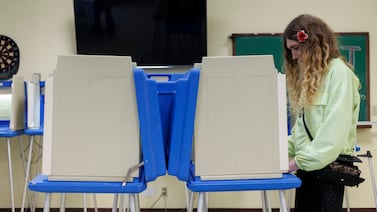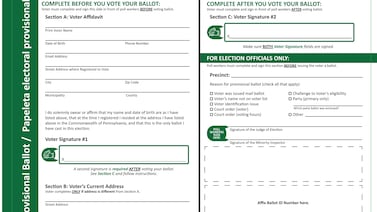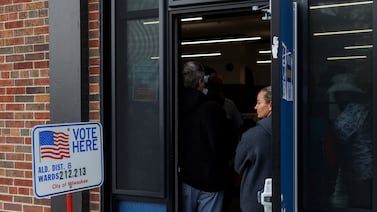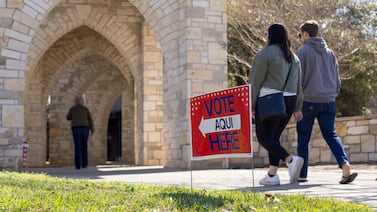Votebeat is a nonprofit news organization reporting on voting access and election administration across the U.S. Sign up for Votebeat Arizona’s free newsletter here.
Arizona election officials who suddenly discovered that they hadn’t obtained proof of citizenship from nearly 100,000 registered voters were relieved last month when the Arizona Supreme Court ruled that they wouldn’t be required to ask for it before the November election.
But new details that have come out since then are raising questions about the state’s handling of the error. The Secretary of State’s Office issued a revised estimate that said more than twice as many voters — 218,000 — were affected, indicating that officials didn’t have a clear picture from the Motor Vehicle Division about just how many voters were affected by a database error, or why, when they provided recommendations to the court on how to solve the issue.
State law in Arizona requires voters to provide proof of citizenship to vote in state and local elections, but the court had said it was too close to the election to ask these voters for the documents, especially since the problem with collecting the documents wasn’t their fault. These voters — who most probably had the proof but just hadn’t provided it to the state — would be allowed to vote a full ballot in November, the court ruled, rather than being placed on a separate list of voters who can vote only in federal elections.
The problem was at first characterized as a glitch that provided incorrect license issuance dates for the voters to election officials, which signaled to them that the MVD had proof of citizenship on file when it did not. New information obtained by Votebeat this week showed that the MVD has historically categorized anyone with a pre-1996 license as a U.S. citizen, even though the agency has not obtained their proof of citizenship, such as a birth certificate or passport. It’s unclear how or whether this would have affected the citizenship checks, which mainly relied on the issuance date.
This has been the case since 2004, when the system was initially programmed, according to a spokesperson with the Arizona Department of Transportation
Republicans target Secretary of State Fontes
As the Nov. 5 election approaches quickly — with mail ballots set to go out next week — the evolving explanations are unnerving some people who initially supported the court’s decision, including the Arizona Republican Party, which is now directing its criticism at Secretary of State Adrian Fontes.
“Now we find out that he hasn’t been as forthcoming with Arizonans as we would have hoped,” Arizona GOP Chair Gina Swoboda said. “We find that troubling, and will be taking additional action in the coming days.”
Separately, the Donald Trump-aligned America First Legal Foundation sued the state Thursday on behalf of conservative Strong Communities Foundation of Arizona, asking the court to force the secretary to release the names of the voters whose citizenship proof is in question.
In a response to an earlier public records request from the group, the Secretary of State’s Office wrote Sept. 24 that the data on affected voters was not yet final, and that releasing it too soon “would create confusion, chaos, uncertainty and consternation among the public — all of which is avoidable, and indeed must be avoided amid an ongoing election during which we expect to receive record turnout.”
The slow unraveling of the mysterious glitch has fueled misinformation about who the voters are and why the situation is happening. Republican elected officials and leaders across the country are claiming that the problem is evidence of cheating and that all the people on the list are noncitizens. That’s not the case: All of the voters attested to their U.S. citizenship under penalty of perjury when they registered to vote, as required by federal law. Only two on the list have so far been identified as noncitizens.
How, and how many, voters were miscategorized
Overall, at least 696,713 residents in Arizona received their license prior to 1996 and have been categorized in state records as U.S. citizens, without providing proof of citizenship. At least 218,000 of them are voters, according to data provided by the Secretary of State’s Office.
The office found out from MVD shortly after the court’s ruling that the number of voters involved was far more than initially reported. At the time, the office couldn’t explain exactly why the number had grown, or whether it was a final number.
Of the 218,000, the office said, 79,000 are Republicans, 61,000 are Democrats, and 76,000 are not registered with either party.
The Secretary of State’s Office has begun researching the citizenship of those affected using federal and state databases, and asking for expedited access, to narrow down the list.
The problem has been occurring since 2004, when Arizona enacted a unique law requiring documented proof of citizenship to vote. Under federal law, all U.S. voters must attest to their citizenship to register, but do not need to prove it. In 2014, the U.S. Supreme Court ruled that Arizona must allow residents who do not provide proof to vote in federal elections. That created the separate “federal only” voter roll of people who can vote only in federal elections.
Under the law, Arizona driver’s licenses issued after October 1996 count as proof of citizenship for someone registering to vote. That’s because in October 1996, Arizona began requiring such proof to get a regular driver’s license, and started issuing noncitizens, such as green card holders, a different type of license. Before that, there was no such differentiation.
Because of that change, election officials often use information provided by MVD about driver’s licenses to confirm citizenship. When they query the MVD system for the information, they are able to see both an issuance date and a code indicating that the resident is a U.S. citizen, and they use those two criteria to determine a voter’s eligibility.
Under the MVD’s coding, if someone had received a license prior to 1996, they are coded as a “4,” which indicates U.S. citizen. On election officials’ screens, that code showed up as either “4” or “US Citizen/Non Foreign,” depending on the county. That would incorrectly indicate that someone had provided proof of citizenship.
But the election officials also had access to the voters’ license issuance date, which, if correct, should have alerted officials that they still needed to obtain the voter’s proof of citizenship.
In Maricopa County, officials were using both the date and the citizenship status to make the determination, according to a spokesperson. And in Yavapai County, Registrar of Voters Matt Webber said that the system would flag 1996-licenses, but it was rare.
The problem was that the issuance date was wrong in many cases.
The 98,000 voters first announced as being affected by the problem had a pre-1996 license, but when they registered to vote sometime after 2004, the system was showing the date of the last time they got issued a duplicate license— to replace a lost card, for example — not their original issuance date. Residents getting duplicate licenses don’t provide proof of citizenship at the time. But since the election official would in some cases see a date after 1996, they would assume the person provided proof of citizenship.
The second round of voters affected also had pre-1996 licenses, but when they registered to vote sometime after 2004, the system was showing the date of the last time they renewed or received a reinstatement of their license. The MVD has not historically required proof of citizenship when issuing reinstatements and renewals. But again, if the issuance date was after 1996, it gave the recorders the impression that the person had provided the documentation. That was the case for 120,000 more voters.
The Secretary of State’s Office has indicated the voters will need to provide documented proof of citizenship after the November election.
Jen Fifield is a reporter for Votebeat based in Arizona. Contact Jen at jfifield@votebeat.org.





